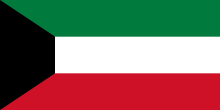The Kuwait Portal Kuwait, officially the State of Kuwait, is a country in West Asia. It is situated in the northern edge of Eastern Arabia at the tip of the Persian Gulf, bordering Iraq to the north and Saudi Arabia to the south. Kuwait also shares maritime borders with Iran. Kuwait has a coastal length of approximately 500 km (311 mi). Most of the country's population reside in the urban agglomeration of the capital and largest city Kuwait City. , Kuwait has a population of 4.82 million people of which 1.53 million are Kuwaiti citizens while the remaining 3.29 million are foreign nationals from over 100 countries. Historically, most of present-day Kuwait was part of ancient Mesopotamia. Before the discovery of oil, Kuwait was a regional trade port. Oil reserves were discovered in commercial quantities in 1938. In 1946, crude oil was exported for the first time. From 1946 to 1982, the country underwent large-scale modernization, largely based on income from oil production. In the 1980s, Kuwait experienced a period of geopolitical instability and an economic crisis following the stock market crash. In 1990, Kuwait was invaded and subsequently annexed by Iraq under the leadership of Saddam Hussein following disputes over oil production. The Iraqi occupation of Kuwait ended on 26 February 1991, following military intervention by a coalition led by the United States and several other nations. Like some of the other Arab states in the Persian Gulf, Kuwait is an emirate. The emir is the head of state and the Al Sabah is the ruling family which dominates the country's political system. Kuwait's official state religion is Islam, specifically the Maliki school of Sunni Islam. Kuwait is a high-income economy, backed by the world's sixth largest oil reserves. Kuwaiti popular culture, in the form of theatre, radio, music, and television soap opera, is exported to neighboring GCC states. Kuwait is a founding member of the GCC and is also a member of the UN, AL, OPEC and the OIC. (Full article...) Selected article - The petroleum industry in Kuwait is the largest industry in the country, accounting nearly half of the country's GDP. Kuwait has proven crude oil reserves of 104 billion barrels (15 km3), estimated to be 9% of the world's reserves. Kuwait's oil reserves are the sixth largest in the world and the Burgan Field is the second largest oil field. Kuwait is the world's eleventh largest oil producer and seventh largest exporter. Kuwait's oil production accounts for 7% of world-wide oil production. Since the government of Kuwait owns the petroleum industry, it controls a lot of the country's economy; in all, about 43 percent of the GDP. Kuwait’s oil exports vary depending on internal needs – almost all of Kuwait’s energy is derived from oil – and on international demand and prices and production quotas fixed by the OPEC, of which Kuwait is a member. OPEC’s quotas, however, are difficult to enforce, and Kuwait and other countries have been accused of violating them. In 2005, oil production was an estimated 2.418 million bbl/day. (Full article...)Did you know...
Related portalsReligions in Kuwait MENA states TopicsWikiProjectsAssociated WikimediaThe following Wikimedia Foundation sister projects provide more on this subject:
Discover Wikipedia using portals |







































